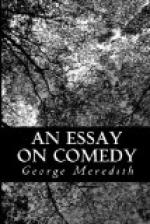’Ego limis specto sic per flabellum clanculum.’—
Terence.
That fan is the flag and symbol of the society giving us our so-called Comedy of Manners, or Comedy of the manners of South-sea Islanders under city veneer; and as to Comic idea, vacuous as the mask without the face behind it.
Elia, whose humour delighted in floating a galleon paradox and wafting it as far as it would go, bewails the extinction of our artificial Comedy, like a poet sighing over the vanished splendour of Cleopatra’s Nile-barge; and the sedateness of his plea for a cause condemned even in his time to the penitentiary, is a novel effect of the ludicrous. When the realism of those ‘fictitious half-believed personages,’ as he calls them, had ceased to strike, they were objectionable company, uncaressable as puppets. Their artifices are staringly naked, and have now the effect of a painted face viewed, after warm hours of dancing, in the morning light. How could the Lurewells and the Plyants ever have been praised for ingenuity in wickedness? Critics, apparently sober, and of high reputation, held up their shallow knaveries for the world to admire. These Lurewells, Plyants, Pinchwifes, Fondlewifes, Miss Prue, Peggy, Hoyden, all of them save charming Milamant, are dead as last year’s clothes in a fashionable fine lady’s wardrobe, and it must be an exceptionably abandoned Abigail of our period that would look on them with the wish to appear in their likeness. Whether the puppet show of Punch and Judy inspires our street-urchins to have instant recourse to their fists in a dispute, after the fashion of every one of the actors in that public entertainment who gets possession of the cudgel, is open to question: it has been hinted; and angry moralists have traced the national taste for tales of crime to the smell of blood in our nursery-songs. It will at any rate hardly be questioned that it is unwholesome for men and women to see themselves as they are, if they are no better than they should be: and they will not, when they have improved in manners, care much to see themselves as they once were. That comes of realism in the Comic art; and it is not public caprice, but the consequence of a bettering state. {2} The same of an immoral may be said of realistic exhibitions of a vulgar society.
The French make a critical distinction in ce qui remue from ce qui emeut—that which agitates from that which touches with emotion. In the realistic comedy it is an incessant remuage—no calm, merely bustling figures, and no thought. Excepting Congreve’s Way of the World, which failed on the stage, there was nothing to keep our comedy alive on its merits; neither, with all its realism, true portraiture, nor much quotable fun, nor idea; neither salt nor soul.




